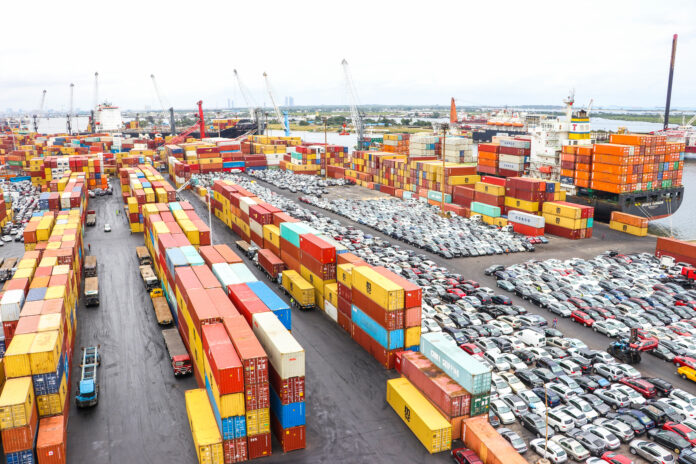The Lagos State Government has criticised the Nigerian Ports Authority (NPA) over its plan to shift more cargo operations from Lagos ports to the Warri Port Complex in Delta State. The NPA says the move is part of a strategy to reduce congestion at the busy Apapa and Tin Can Island ports, which handle most of Nigeria’s import and export traffic.
But the Lagos State Government insists that the congestion problem is not caused by the Lagos ports themselves. Instead, it blames long-standing policy and operational failures within the NPA.
The disagreement highlights the growing tension between Lagos, the country’s main commercial hub, and the NPA, the federal agency responsible for port management.
Recent operational figures released by the NPA show improved performance at the Warri and Koko ports, both located in Delta State. According to the authority, cargo throughput has increased, and turnaround time for vessels has improved. The NPA argues that these gains show the benefits of shifting some maritime traffic away from Lagos, where congestion has slowed cargo evacuation for years.
For more than a decade, congestion in the Apapa port corridor has been one of Nigeria’s most persistent economic problems. Long queues of trucks, bad roads, poor traffic coordination, and delays in clearing cargo have all contributed to heavy economic losses for businesses. The NPA believes that opening up other ports across the country is the most sustainable way to ease the pressure.
However, the Senior Special Assistant on Transportation and Logistics to Governor Babajide Sanwo-Olu, Mr. Adekoya Hassan, disagrees with the NPA’s approach. In an interview, Hassan said diverting operations from Lagos to Warri is not a solution but a way of avoiding the real issues.
“The NPA’s decision to divert attention from Lagos ports to Warri due to congestion highlights the urgent need for a comprehensive overhaul of its policies,” he said. “Governor Sanwo-Olu has remained committed to resolving the traffic situation, but entrenched institutional practices within the NPA continue to undermine progress.”
Hassan stressed that the Lagos State Government has invested heavily in road rehabilitation, traffic management, and security around the Apapa axis. He said that without reforms within the NPA, these efforts cannot fully succeed.
Hassan listed several problems he says have contributed to the gridlock around the ports. These include:
Excessive toll points on port access routes
A malfunctioning e-call-up system, which was introduced in 2021 to regulate truck movement
Favouritism and racketeering by some officials
Abuse of authority by senior NPA staff
The spread of misleading narratives through truck unions
According to him, these internal issues, rather than Lagos itself, are responsible for the consistent traffic chaos.
Port congestion in Lagos has worsened over the years due to the concentration of Nigeria’s maritime activities in only two ports—Apapa and Tin Can Island. Together, they handle about 70 per cent of the country’s import and export cargo.
Although Nigeria has several other ports—such as Warri, Calabar, Port Harcourt, and Onne—many of them have suffered from underinvestment, insecurity in surrounding waterways, and shallow drafts that limit vessel size. This has made Lagos the default port for most shipping companies, adding extreme pressure to the already congested road network.
The federal government has long encouraged the development of alternative ports to reduce dependence on Lagos, but implementation has been slow.
Hassan argued that if the NPA updates its policies to meet current economic demands, congestion in Lagos can be reduced significantly without shifting operations to Warri. He said Lagos ports remain the most viable in the country due to their capacity, location, and established infrastructure.
“Modernising the operational framework of the NPA would make the shift to Warri unnecessary and, in our view, an unpopular choice,” he explained.
He also stressed the importance of giving President Bola Tinubu the correct information on the causes of the congestion crisis. According to him, it is essential for the presidency to understand that the root of the problem lies within NPA systems and processes.
The conversation around Lagos port congestion goes beyond politics. The Apapa corridor is a key gateway for Nigeria’s economy. Delays in clearing containers increase the cost of goods, discourage foreign investment, and slow down local manufacturing.
Businesses in Lagos have repeatedly complained about losing millions of naira daily due to the gridlock. Truck drivers sometimes spend days or even weeks waiting to enter the ports, causing fuel waste, cargo delays, and higher transportation costs.
The NPA’s plan to expand activities in Warri is seen by some economic experts as a way to distribute traffic more evenly across Nigeria, reduce dependence on Lagos, and stimulate growth in other regions. However, critics argue that without fixing the systemic challenges in Lagos, shifting cargo will only transfer problems elsewhere.
The disagreement between Lagos State and the NPA underscores the need for a coordinated national strategy on port management. While Lagos wants reforms within the NPA, the federal agency insists on the need to boost the use of other ports to ease pressure on the nation’s busiest maritime hub.
As Nigeria continues to expand its trade volume and attract new shipping routes, resolving the congestion crisis remains a top priority for both state and federal governments.

